Key takeaways:
- Parenting mistakes offer crucial lessons, encouraging reflection on intentions and fostering growth and connection.
- Consistency in rules and emotional presence is vital for children’s security and development.
- Modeling vulnerability and open communication strengthens relationships and helps children process emotions.
- Embracing change, self-compassion, and gratitude can significantly enhance parenting effectiveness and bond with children.
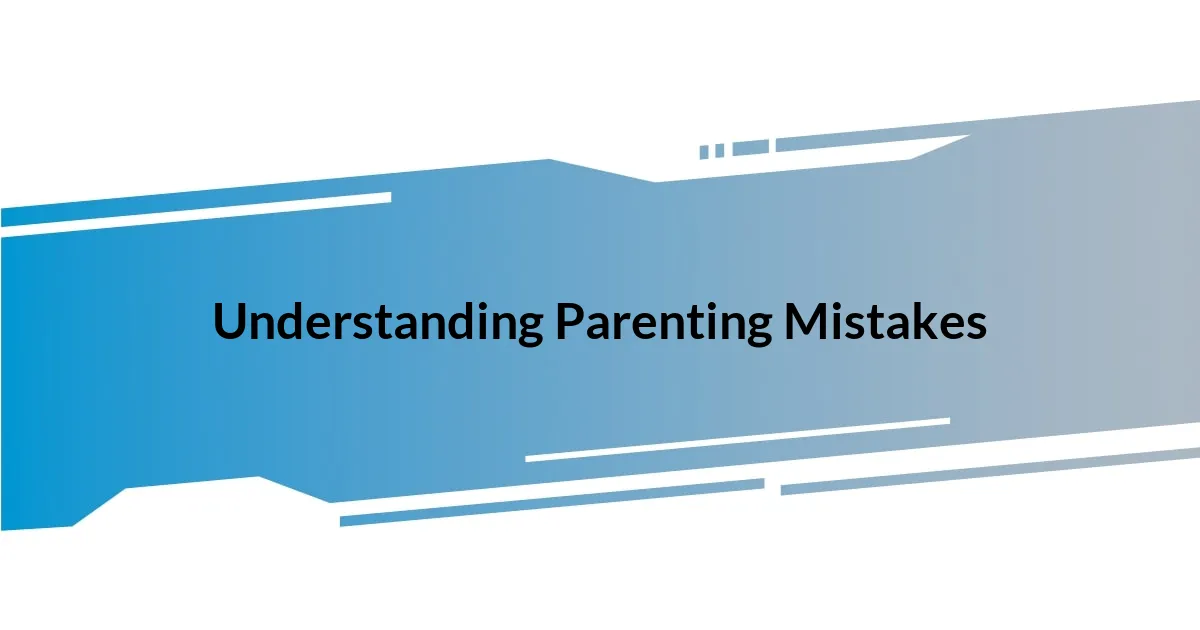
Understanding Parenting Mistakes
Parenting mistakes are almost a rite of passage for every parent. I remember a time when I thought being firm was the way to show my love, but it only led to misunderstandings with my child. Was I really guiding them, or just imposing my will? Realizing my authoritative approach stifled their creativity was a wake-up call.
Every mistake I made became an unexpected lesson. For instance, there was a moment when I dismissed my child’s feelings about a new school—thinking they would adapt quickly. I reflect on how that dismissal affected their self-esteem. It makes me wonder, are we too quick to invalidate our children’s emotions because we don’t fully understand them ourselves?
Understanding parenting mistakes isn’t just about identifying where we went wrong; it encourages us to reflect on our intentions and feelings. I often think about how my own upbringing shaped my responses. It’s fascinating to consider how my experiences influence how I interact with my kids. What if instead of focusing on avoiding mistakes, we embraced them as opportunities for growth and connection?
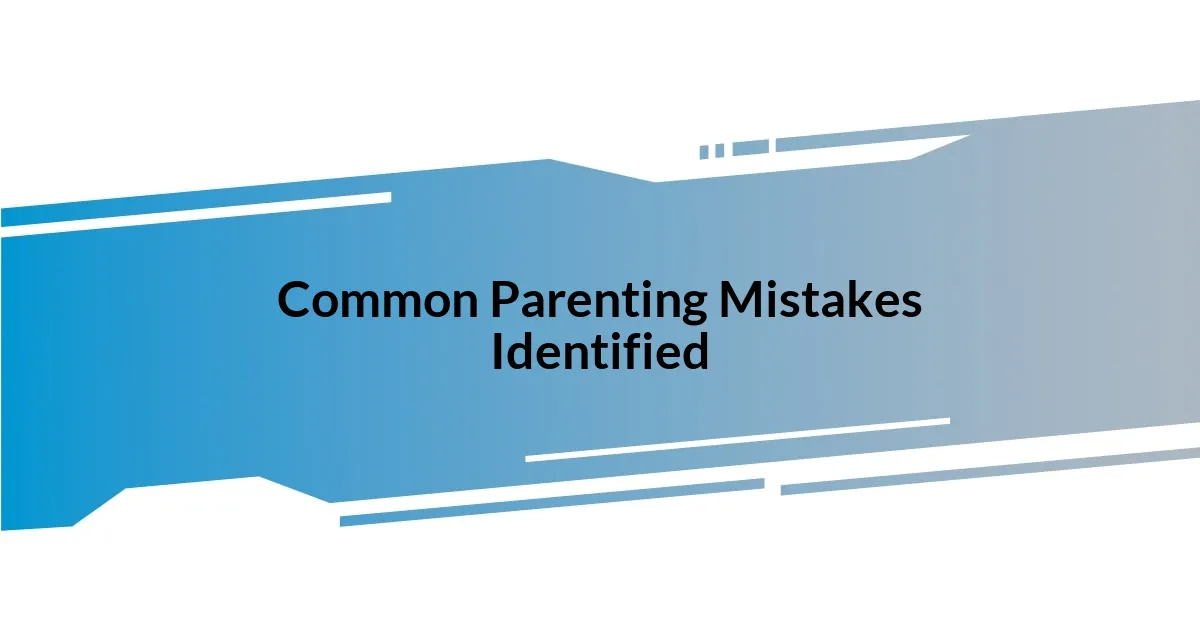
Common Parenting Mistakes Identified
When reflecting on common parenting mistakes, one that stands out is the lack of consistency in rules and expectations. There was a phase when I would alternate between being lenient and strict, depending on my mood or the situation. This inconsistency left my kids confused—how could they be sure of what was expected of them? It taught me that children thrive on clear boundaries, and ambiguity only breeds insecurity.
Another mistake I often made was prioritizing my own agenda over my child’s needs. I vividly recall a time I rushed through family dinner, eager to catch up on work. My daughter attempted to share an exciting story about her day, but I brushed her off. The disappointment in her eyes was heart-wrenching. That moment revealed to me the importance of being present in our children’s lives; it’s not just about physically being there, but emotionally engaging with them as well.
Moreover, I’ve neglected to model healthy emotional expression. Growing up, my own parents often kept their feelings to themselves. I inadvertently repeated this pattern, mistakenly thinking it would strengthen my kids’ resilience. However, I learned that demonstrating vulnerability can help my children understand and process their own emotions better. It is a profound realization that nurturing open communication paves the way for deeper connections.
| Parenting Mistake | Personal Insight |
|---|---|
| Lack of Consistency | Confusing rules lead to insecurity in children. |
| Pursuing Personal Agendas | Being present emotionally is crucial for connection. |
| Neglecting Emotional Expression | Modeling vulnerability strengthens understanding of emotions. |
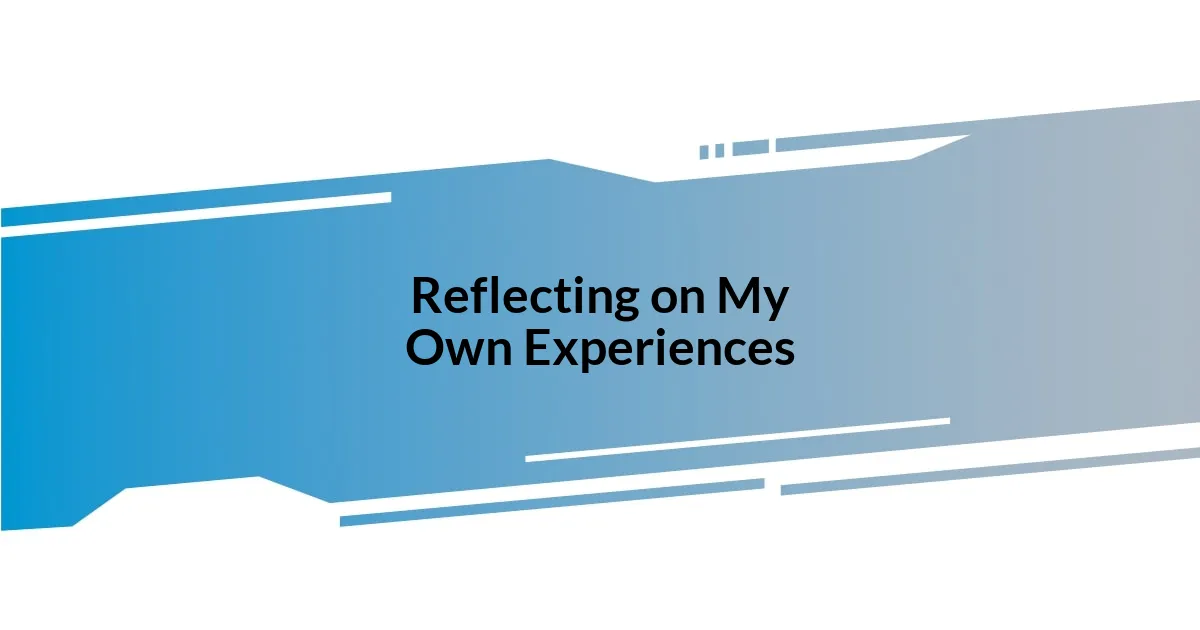
Reflecting on My Own Experiences
Reflecting on my own experiences in parenting has often brought me face to face with my shortcomings. One particular evening stands out; I snapped at my son over a trivial issue—the volume of his video game. In that moment, I forgot it was his way of unwinding after a challenging day at school. I felt a pang of regret as I saw him retreat into his room, shutting the door quietly, and I realized that my frustration overshadowed his need for connection. That incident taught me to pause and consider what might be causing my child’s actions rather than reacting impulsively.
Here are a few key lessons I’ve learned from my parenting reflections:
- Pause Before Reacting: Giving myself a moment to breathe can clarify my thoughts and lead to a more compassionate response.
- Empathy Over Authority: When I prioritize understanding my child’s perspective, it strengthens our bond and promotes open communication.
- Embrace Vulnerability: Sharing my own feelings with my kids allows them to see that it’s okay to express their emotions, creating a safe space for dialogue.
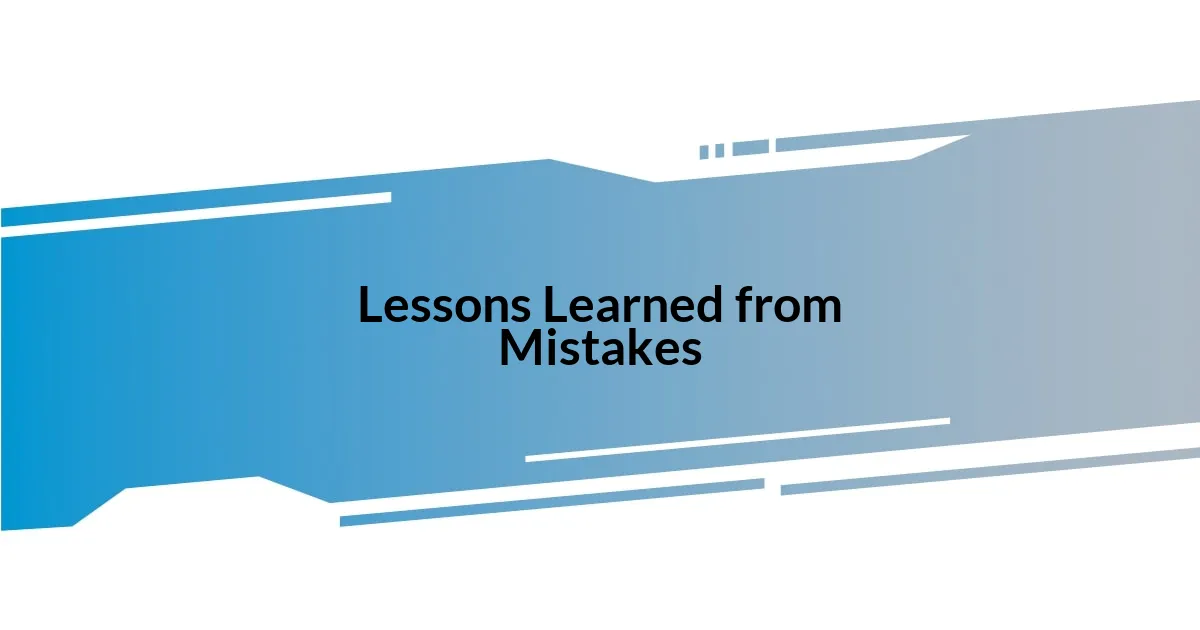
Lessons Learned from Mistakes
Mistakes are often my best teachers in parenting. One time, I became frustrated when my daughter didn’t quite grasp a math concept. Instead of patiently explaining it again, I let my impatience show, which dimmed her enthusiasm for learning. In hindsight, that moment reinforced my belief that patience and encouragement can ignite a child’s willingness to tackle challenges. How can we expect our kids to embrace learning if we don’t model that attitude ourselves?
During another instance, I found myself caught up in the chaos of everyday life, rushing through our bedtime routine. I remember the weary look on my son’s face as I hastily read him a story, barely giving him any eye contact. It dawned on me then: those precious moments before sleep are not just a ritual, but a vital connection point. This taught me to savor those moments and truly invest my presence. Have you ever noticed how a little extra attention can transform an ordinary routine into a cherished memory?
I’ve also learned the importance of owning my mistakes. There was a time when I dismissed my son’s hurt feelings when he lost a game, brushing it off with a cliché about winning and losing. I could see the disappointment etched on his face and realized my dismissal didn’t validate his experience. A simple acknowledgment of his feelings could have made all the difference. Looking back, it strikes me how critical it is for us, as parents, to foster an environment where feelings are not only acknowledged but truly valued. Isn’t it essential for our children to feel heard? When we embrace our missteps, we not only grow; we also model resilience for our kids.
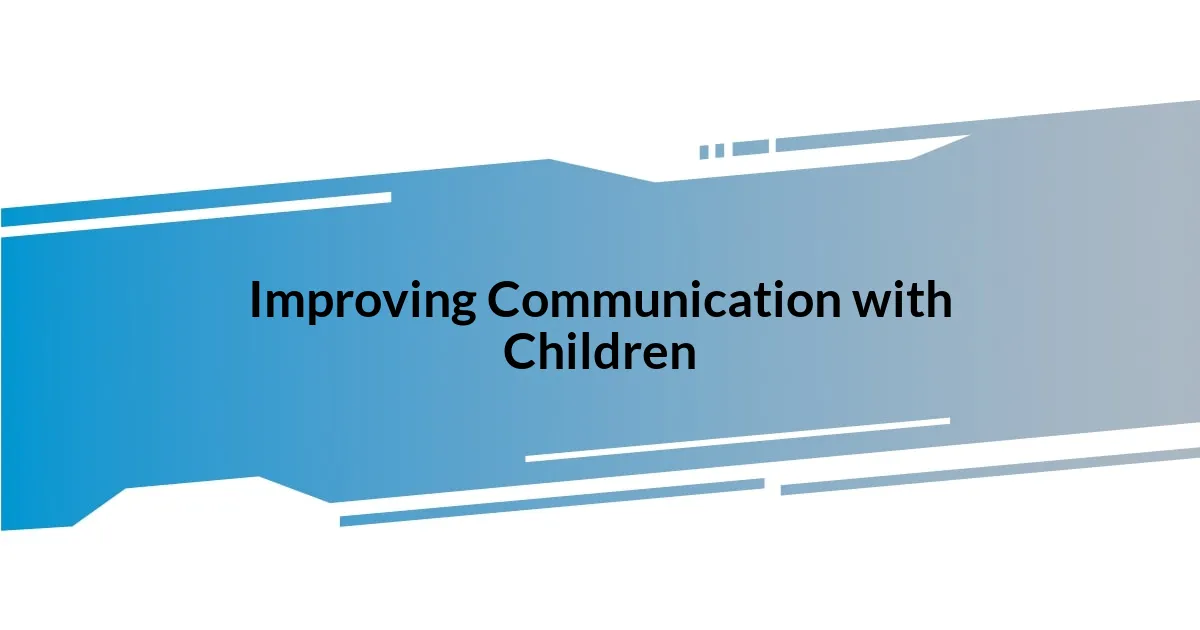
Improving Communication with Children
Improving communication with children starts with intentional listening. I remember one afternoon, my daughter was eager to share what she had learned in school, her eyes lighting up with excitement. Instead of rushing her, I put down my phone and focused entirely on her. It was in that moment I realized the impact of giving my full attention; it not only made her feel valued but also deepened our relationship.
Another lesson I’ve embraced is the power of asking open-ended questions. I used to ask my son simple yes or no questions, which led to brief conversations. Shifting to more engaging prompts like “What was the best part of your day?” opened doors to discussions I never expected. These conversations often reveal insights into his world, helping me understand his thoughts and feelings on a deeper level. How often do we overlook the potential of meaningful dialogue with our kids?
Finally, I’ve learned to embrace honesty, even when it feels uncomfortable. One day, while discussing my own frustrations, I admitted to my daughter that I sometimes felt overwhelmed by work pressures. Her response was heartwarming; she expressed her own struggles, and we found common ground. This exchange taught me that showing vulnerability invites trust, encouraging my children to share their own fears and joys. Isn’t it fascinating how a candid moment can unlock a treasure trove of understanding between us?
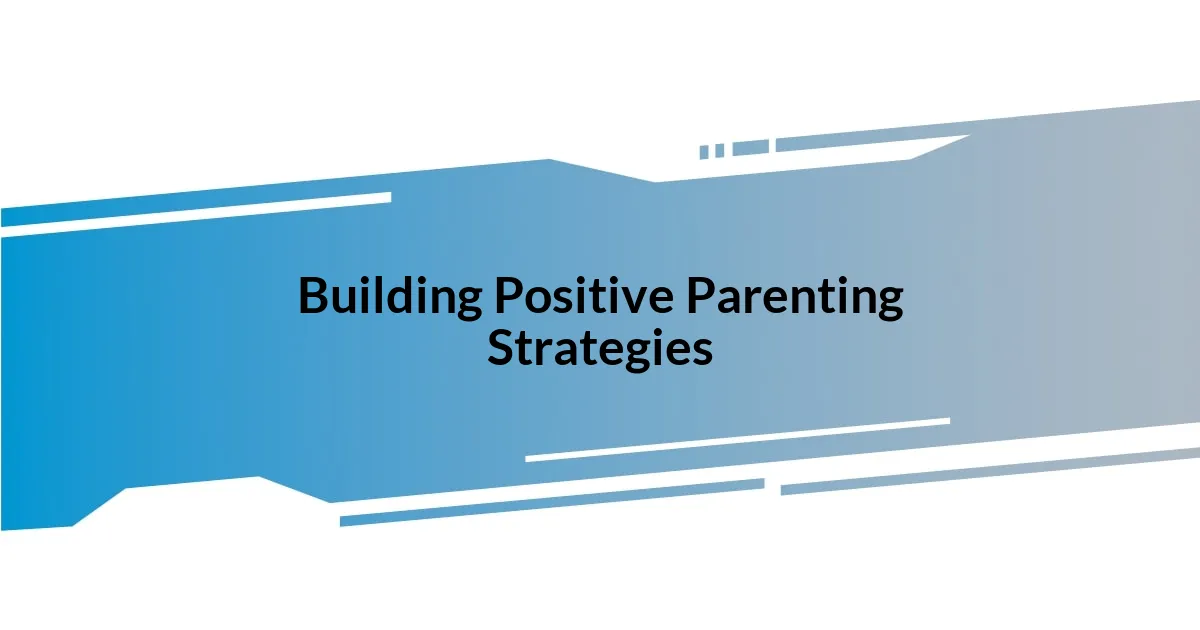
Building Positive Parenting Strategies
Building positive parenting strategies requires self-awareness and reflection. I remember a time when I was overly critical of my daughter’s choices. One afternoon, she painted a picture that didn’t match my idea of “good art.” Instead of celebrating her creativity, I pointed out what I thought was wrong. The disappointment in her eyes was unmistakable, and it reminded me that fostering creativity means embracing imperfection. How often do we let our own expectations stifle the unique expressions of our children?
In another instance, I discovered the importance of routine as a foundation for security. After one particularly hectic week filled with unexpected events, my son struggled to communicate his feelings. I realized that our usual family game night had been neglected amidst the chaos. Reinstating that tradition helped him articulate his worries and connect with us. It became clear to me that these routines are not just activities—they’re lifelines that help our children navigate their emotions. How vital are these anchors in your parenting journey?
Understanding the value of gratitude has also shaped my approach. I once noticed that my son would often focus on his disappointments rather than celebrating his achievements. I decided to implement a simple practice at dinner where we each shared one thing we were grateful for that day. It transformed our conversations and slowly shifted his perspective, enabling him to recognize the positive in everyday situations. Could this small shift be the key to nurturing a positive mindset in our kids?
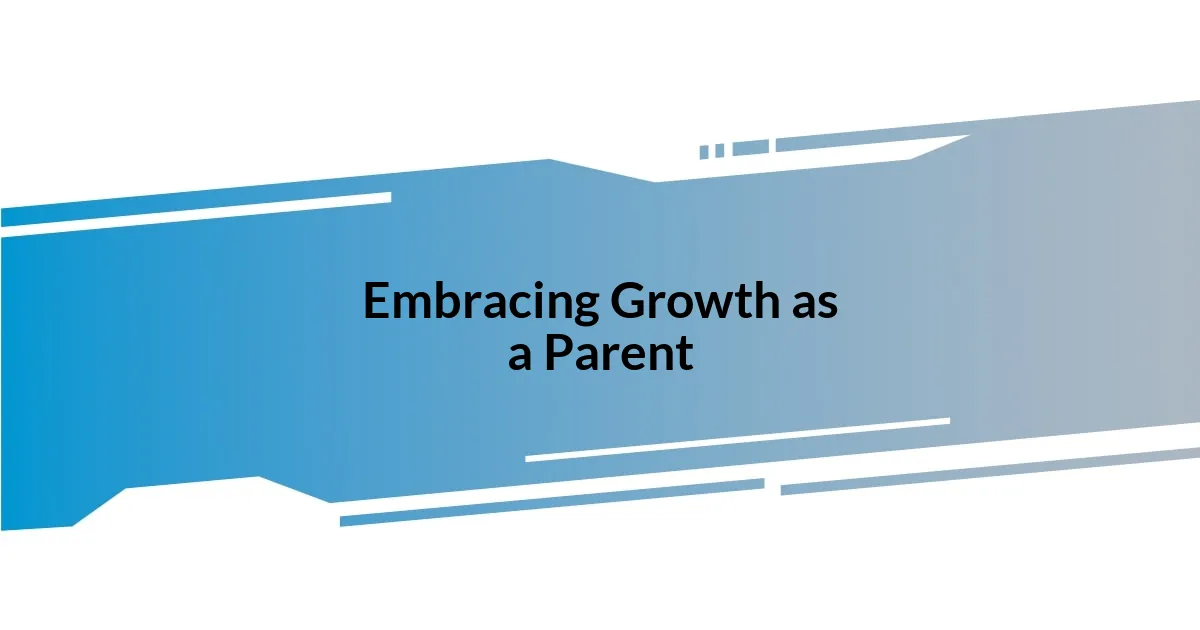
Embracing Growth as a Parent
Embracing growth as a parent has been a transformative journey for me. One day, I found myself in a heated moment with my teenage son over a missed curfew. Instead of escalating the situation, I took a deep breath and reflected on my own youth. I shared a story of my own mistakes, creating a moment where we could laugh about my past blunders. It was eye-opening to see how sharing my experiences humanized our conversation and allowed him to open up instead of shutting down. Have you ever found that vulnerability can bridge the gap between you and your child?
Another aspect of growth I’ve come to appreciate is being open to change. I recall when my daughter decided she wanted to try ballet instead of soccer. Initially, I resisted, fearing she’d abandon her “team spirit.” However, I soon realized that supporting her passions, even when they diverged from my expectations, was a way to encourage her self-discovery. This shift in attitude not only boosted her confidence but also taught me about the beauty of letting go of preconceived notions about what my children should pursue. How often do we hold on to ideas that may limit our children’s potential?
Finally, I’ve come to understand the importance of self-compassion in my parenting journey. There was a day when I lost my patience during a long car ride filled with sibling squabbles. Instead of beating myself up afterward, I took a moment to forgive myself and reflect on what triggered my frustration. Acknowledging my own limitations allowed me to approach my kids with more empathy the next time chaos erupted. Isn’t it interesting how forgiving ourselves can lead to healthier relationships with our children?